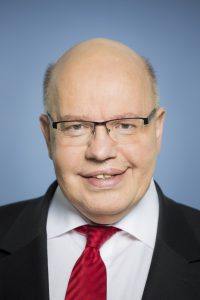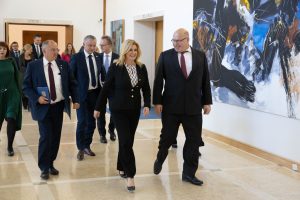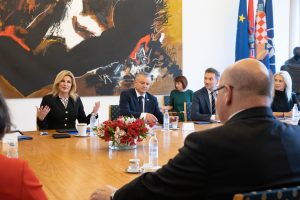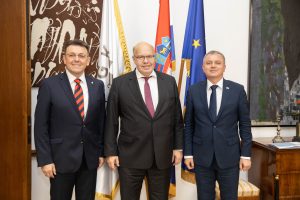Germany is Croatia’s main foreign trade partner with over €5 billion generated in 2018. Croatian Prime Minister Andrej Plenković made the remarks while meeting in October with visiting Germany’s Federal Minister of Economic Affairs and Energy Peter Altmaier.

Croatia is particularly interested in investments in the auto industry, and there is a stimulating investment environment, Plenkovic said. Altmaier stressed that southeast Europe is a region of opportunity for all countries and that Germany wants close exchanges with European partners. Plenkovic and Altmaier also discussed the goals of Croatia’s presidency of the European Union, which will begin on Jan. 1, 2020, with Germany taking over the presidency on July 1, 2020. After Croatia, Altmaier visited Montenegro and Serbia. Peter Altmaier (CDU) is the federal Minister of economics and energy in Chancellor Angela Merkel’s cabinet. In an exclusive interview for the November issue of Diplomacy & Commerce magazine, German Federal Economy Minister Peter Altmaier spoke about the EU and the Western Balkan states.
You have visited Croatia, Serbia and Montenegro. What was the reason for this official visit and what were your impressions?
- I attach particular importance to the region of south-eastern Europe. I see a great opportunity for us to be able to complete the unification of continental Europe through the continued convergence of the countries in the region to the EU. I just visited Croatia, the newest EU Member State, and Montenegro and Serbia, two countries which are actively negotiating their accession to the EU with the European Commission. My impressions are extremely positive. The economic dynamism in the countries I visited is highly promising, and German companies are increasing their levels of trade and investment there.
What conclusions will you take with you to Berlin, since you have visited Croatia, an EU member state, and Montenegro and Serbia, which are in the accession process?
– The most important conclusion is that EU enlargement is a success story which equally benefits both the countries in the region and the EU. And we should continue to work hard together on bringing the region closer to the EU – this will round off our EU and enrich us politically, economically and culturally.

How high is the Balkans on the list of priorities of the German economic and European policy? How do you feel about the situation in the Balkan countries today?
– Our conferences on the Western Balkans, which Chancellor Merkel launched in August 2014, have placed the political dialogue with the countries in the region high up on the political agenda. The wide-ranging initiatives taken since then are dubbed the “Berlin process”. Together with the European Commission, the Regional Cooperation Council and of course the private sector, we have made great progress on regional cooperation and the expansion of the necessary infrastructure. We are addressing forward-looking topics, such as digitisation. One important joint challenge is the creation of jobs in the region and the securing of the skilled workers necessary for this.

Does official Berlin share the position of the French President Emmanuel Macron, who wants the EU first to reform itself (before enlarging), or is Germany closer to the position of the European Commission whose officials are in favour of a parallel process of the Union’s integration and enlargement?
– The Bundestag voted by a large majority to commence accession negotiations with Albania and North Macedonia. It is regrettable that the European Council has not been able to arrive at a decision on this yet. I am convinced that we should begin the process of accession with Albania and North Macedonia as soon as possible. We must not lose time.
Your forecasts for the coming year are very optimistic. With Brexit, the US trade war and Chinese competition, we simply have to ask where does that optimism come from?
– Our forecasts are rather restrained. We are predicting growth of 0.5% this year, and somewhat higher growth of 1% next year. That is much less than in previous years. Of course, a major role is played by the difficult external economic environment. However, I am optimistic that we will leave this temporary slow period behind us. To do this, Germany will have to improve its business environment. I have made proposals for this in my SME Strategy, e.g. on corporate tax reform and targeted funding for tomorrow’s technologies.
Croatian-German Economic Forum

European countries must strengthen cooperation in order to maintain Europe’s technological sovereignty, the Croatian-German Economic Forum heard in October with Croatian Economy Minister Darko Horvat saying that Croatia was ready for the first big investment in the auto industry.
The forum was organised by the Croatian Chamber of Commerce (HGK) and the German-Croatian Chamber of Industry and Commerce. It brought together representatives of 60 Croatian and German companies from the service, energy, transport, finance, tourism and telecommunication sectors.
Horvat said the Croatian economy was continually growing by 3% but that it was not enough. In order to ensure bigger growth, which Germany needs too, and be able to confront the trade war between big economies such as the US and China, we must be part of the same concept, and strategic documents and regulations in Berlin and Zagreb must be virtually identical, he added.
We are in a new digital era characterised by political, technological and economic transformations, and the market economy continues to grow, which entails growing competition, making it necessary to constantly work on keeping one’s position, said German Economy and Energy Minister Peter Altmaier.
Europe must keep its technological sovereignty in the future, he added.
Speaking of areas of cooperation between Croatia and Germany, he highlighted industry 4.0, innovations, the use of hydrogen in transport, and the production of batteries for the auto industry. If all batteries came from Asia, one third of our added value would disappear, he said.
Given that Croatia will chair the EU in the first half of 2020 and Germany in the second, Altmaier said the two countries must closely cooperate in the economy to raise their cooperation to a higher level.
He said Croatia must assume the role of a mediator regarding the Balkans and the EU integration of North Macedonia and Albania because, he added, that was a common interest.